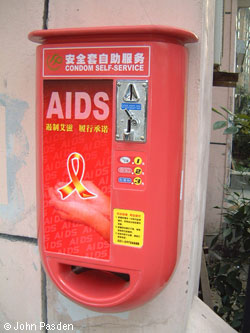As I watched the 17th annual AIDS conference come to an end and the Olympics begin, I found myself wondering what the two host countries might, as members of what Westerners refer to as "developing nations," have in common, especially when it comes to sex and safety. Perhaps surprisingly given that one country struggles just to survive and the other is taking its place as a new world leader, it turns out to be quite a lot.
As the spectacular opening ceremonies of the Olympics take place in Beijing, the saga of "safe sex" is perhaps not so pretty. China was very slow in coming to grips with the arrival of AIDS to that country, where the first case was identified in 1985. Subsequent infection was simply blamed on visiting foreigners infecting unsuspecting Chinese. At that time AIDS and drug addiction were seen as consequences of contact with the West, and AIDS was known as aizibing, the "loving capitalism disease". Poverty also aided its spread, as so many poor people sold their blood in order to keep food on the table, by the mid-90s, the blood banks were full, but were also another source for the spread of the disease.
It was not until 2001 that the Chinese government took its head out of the sand and began a nationwide anti-AIDS campaign. Today, in a population of 1300 million (one out of every five people in the world live in China), .1 percent of its citizens have HIV/AIDS. In 2007, 39,000 died of AIDS and the group most likely to become HIV positive is gay men, who traditionally have been the invisibles in a society that does not want to admit that homosexuality even exists in China; gays have always lived in a sort of netherworld. Education programs about safe sex have left them out of the equation, and they have been the least likely to have had access to condoms and other preventative information. Although there is tacit acknowledgment of this fact, this is still the worst affected group in China, followed by drug users and sex workers.
To China's credit, beginning in 2001, officials have been trying to educate about prevention, going so far as to require, by the end of 2008, that all hotels in China make condoms available to guests (though these will not be free!) It is also interesting to note that as educational efforts increase in China, the average age of the first sexual encounter is going down, while the percentage of people who have premarital sex is going up. The Chinese are also marrying a bit earlier than in the past, at just under 22.
And then, on the other side of the world, there is the host of a very different kind of international event; as Mexico was the site of the 17th International AIDS Conference, it is interesting and very disturbing to look at what HIV/AIDS is doing to that nation. First, .3 percent of Mexicans have AIDS; it is estimated that almost 3,000 of those are children under 14 and these are said to be the most marginalized of all of Mexico's victims. But the biggest threat appears to be its porous borders between the US and Tijuana, where millions of people cross back and forth every week. Most of these border crossers are illegals (in the US) and live pretty sad existences. The men - who are the majority - participate in dangerous behaviours, to include "man-to-man" sex, drug use, sex with prostitutes, and are travelling AIDS incubuses, which is a double threat to Mexico and the US. Though it is impossible to tweeze out just who is living where when, the available numbers are disturbing: people of Mexican-origin make up 15% of the US population and they account for 18% of the new AIDS yearly diagnoses in that country. Just which of these are Mexican migrants is impossible to know, as they are the least likely to go for testing. But, it is known that small border towns are seeing increasing numbers of cases, and there are more and more reports of the partners of migrant workers contracting the disease after their partners return from working in the US. The majority of these are of child bearing age, which of course means more and more AIDS babies.
So, the hosts to the most spectacular Olympics opening ceremonies ever and the hosts to the conference which continued to pass on the bad news about the state of the world’s sexual health do have some things in common: A large percentage of those who are becoming infected in those cultures are gay men, yet only 1% of the monies spent on education and prevention is directed toward them; in China, gay men are 45 times more likely to contract HIV than straights, in Mexico, they are 109 times more likely - both countries are on the top of the heap in regards to the sharp increase in gays contracting HIV/AIDS. The reasons are probably obvious: both countries suffer from cultural norms which foster homophobic and social hostility toward gays, which has completely marginalized this group.
Meanwhile, HIV/AIDS continues to spread almost unchecked amongst Chinese and Mexican gays.

 RSS Feed
RSS Feed